A Short Run is bigger and better and bigger than ever
The Short Run Comix and Arts Festival this year looked a lot like Short Runs past: there was a tremendous bake sale; more zines, comics, and books than any human being could read in a lifetime; an animation project; activities for kids; speakers and art shows; legendary local creators and brand-new young cartoonists with their very first books. It's a convivial celebration of hand-made art — the kind of art that is made for its own sake, to represent a perspective that doesn't get time and attention in the mainstream media.
Short Run is, in short, always one of our very favorite events in the Seattle literary calendar year. Most years, it winds up being our single favorite event. It's all about balance: there's a mix of young and old, familiar and new, fun and serious. Short Run is meticulously planned, but it still feels like a really good afternoon hang with all your friends. This should be impossible, but somehow it works.
But there was something different about Short Run this year: it was packed. Every Short Run in the history of the festival has been crowded. But this year's Short Run felt, from beginning to end, almost besieged with comics and zine fans. Some publishers we talked to said they were selling far more books than in festivals past, and a few cartoonists said they were seeing more people take interest in their work. More than one person worried that the fire department might be called to shut the show down for overcrowding.
That said, the crowding didn't feel dangerous. Everyone was polite as they tiptoed around each other to get to a mobbed table. Children were given wide berths and watched after affectionately by strangers. People, in short, weren't assholes about it: we were all there for a common purpose, after all, and that purpose ultimately boiled down to fun.
In our first circuit around the floor, we checked in with many of our perennial favorite local Short Run attendees. A short overview, though you'll likely be hearing more about many of these books in the weeks to come on this site:
- David Lasky, Seattle's Comics Goodwill Ambassador™, brought two new books to the show: volume 9 of his Manifesto Items collection of the short comics, sketches, and assorted works he's worked on over the past year; and a new book of cat sketches. Lasky also brought along a preview of his upcoming graphic novel history of the Georgetown Steam Plant, which he and Mairead Case were commissioned by the city to produce in 2017. The book looks ambitious and densely researched, and we can't wait to read it.
- Marc Palm, the Mad-Magazine-published local cartoonist who does sex and violence better than just about anyone, brought a new collaboration minicomic with Brandon Lehrman about the mythical "Florida Man," a mulleted demigod in reflective wraparound sunglasses.
- Everybody's favorite debut cartoonist of the year, Susanna Ryan, a.k.a. Seattle Walk Report, continued to enjoy the loss of her anonymity by exhibiting her wonderful collection of Seattle walking cartoons and a mini made just for the show: Seattle Coal Chute Crimes of the 1930s. Here's hoping this is the first of a new densely researched series of Seattle history comics from Ryan.
- Short Run co-founder Kelly Froh debuted a brand-new comic called The Downed Deer, a moody work of fiction that takes a surprising turn.
- Colleen Frakes was proudly showing off a remastered and expanded tenth edition of her Ignatz Award-winning young adult fable Woman King.
- And Short Run co-organizer Mita Mahato, whose paper-cut comics poems always take different forms and formats, was at the show with a delicate and compact series of short poems about animals, It's All Over. Mahato has demonstrated a vast and growing empathy for the animal kingdom in her work over the past few years, and this gorgeous palm-sized collection looks like another evolution in that direction.
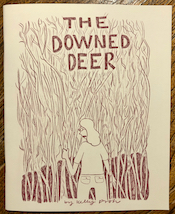
We can't wait to dig in to all these books. Stay tuned for reviews as soon as we can devour them.
Over the last year, Ezra Claytan Daniels has rocketed from relative obscurity to become the king of indie comics. His sci-fi thriller about the quest for eternal love, Upgrade Soul, has been nominated for just about every award in comics. The afterlife quest comic he wrote for cartoonist Ben Passmore, BTTM FDRS, has been a bestseller for Fantagraphics Books. And we were excited to get our hands on a copy of his new polemic, Are You At Risk for "Empathy Myopia?" A Thought Experiment for Privileged Readers, which he described to us in an interview last month. Daniels is pitching the comic as a way to resolve the broken political discourse in this country — is that all? — and when he handed us the book, he had a suggestion: "Make sure to give it to your most problematic family member," he laughed.
In the world of New Fears, the circuits are miswired. Flip on the light, and you disappear; take scissors to your hair, and a dark gash appears across your eyes. In four precise squares per square page, in sharp black, cyan, and coral, Anuj Shrestha draws subtle nightmares that subvert the expectations of illustration. An illustrator with work in the New York Times, Wired, and more, Shrestha owns the art of small stories, and the chills he invokes with the macabre translate quickly to the pragmatic: a world where dinosaurs become jets become ocean, where perspective transforms child staring through a fence into children staring out. He's drawing out our fears — which are rapidly becoming old.
Moniker Press (Vancouver, BC) is about small runs (ahem) and ephemera, and especially collaborations between writers and visual artists.fol.ci shows how multiple artists can transmute an idea, batting it back and forth like two cats with a mouse. Viorica Hrincu's short series of poems approach a loss of something considered essential to beauty, which is essential to being loved. While Hrincu’s measured verse plays out, page by page, Melissa Soleski's illustrations build crazed, uncertain stairways, host strange hair-creatures, weep and discover the brightness of flame and flower.
One thing we noticed at Short Run this year: Riso printing is so hot right now. The sheer number of gorgeous, hand-printed books was through the roof compared to Short Runs last. Simply put: people's work looked really, really good. It's still hand-made, but there's a professionalism and an artistry to risograph printing that mass-produced paperbacks simply can't touch. The inclusion of so much riso printing definitely drove up the per-item average cost at Short Run to heretofore unprecedented levels — this kind of artistry doesn't come cheap — but it made the show even more beautiful than ever.
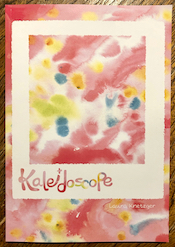
We're always glad to run across Laura Knetzger at her table. After falling hard for her series Bug Boys a few years back, we make sure to check out what's new in her world. The big news, of course, is that Penguin Random House is putting out a collected Bug Boys in February, so that is something to look forward to in the new year.
Sadly, that meant no new update of the ongoing comic this year. Instead, we picked up the first issue of her new Kaleidoscope, a book with three original medium-length comics. Unlike Bug Boys, these stories carry adult themes, and use magic and fantastical situations, in what feels like the "real" world, to explore the power in relationships, sexuality, and earnest desires — both unfulfilled, and perhaps, in one case, better left unfulfilled. They are about showing another being your feelings, and discovering where their's may, or may not, join with yours.
Like Bug Boys, they are thoughtful, sweet, and tender in a kind of vulnerable way that Knetzger uniquely embraces, instead of playing it down with irony or other tricks of removal. It reinforces the thought that Knetzger is a truly brave writer — not in the autobiographical sense of inviting you into her personal minutia, but in the sense that the themes she explores appear to be the things that engage and concern her, both philosophically and in her interpersonal relationships. She's like the fantastical Iris Murdoch of Seattle's indie comics scene, and we're lucky to have her.
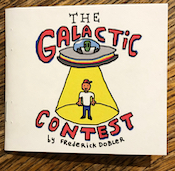
A nine-year old traveling with us was quite taken with The Galactic Contest, a mini-comic from Fredrick Dobler, from Olympia. Not only that, but Dobler, and his tabling companion, sat and asked the nine-year old about his own comics making, and engaged him in a conversation where they took him seriously and listened to what he was creating. Very kind and appreciated, and the comic is good fun — about an earthling abducted by aliens and placed into a contest to save humanity.
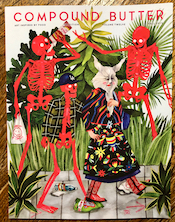
We stopped by the Compound Butter booth to see co-creators Jaya and Jessie Nicely, who travel up from LA to visit Short Run each year. Their delightful quarterly food magazine explores food through cultural and community lenses. The Fall 2019 issue has many delights, including a photo series on the Artist's Diet (artists include Georgia O'Keefe:"Chili Verde with Eggs and Garlic Oil in her breakfast room at Ghost Ranch", and Marcel Proust: "Strong Black Coffee, Boiled Milk, and a Croissant in his bed with his mail delivered on a silver tray"), and many other pieces grouped around the theme of Tradition. If you love food content and writing, and haven't checked out Compound Butter yet, you are in for a real treat.
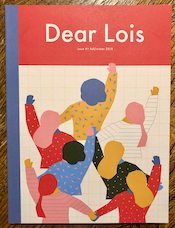
Dear Lois is a magazine subtitled "in the company of growing women", and intended for a teenage girls who might be seeking guidance from adult women on the complications of being a young woman in today's world. "Dear Lois is the older cousin who won't make fun of you for asking 'dumb questions'", is how it's put in the intro to issue 1.
The brainchild of Seattleite Mariah Behrens, Dear Lois is another indie magazine (like Compound Butter, mentioned elsewhere in this article) that raises the bar for indie work. It's absolutely gorgeous — printed in Vancouver at the storied Hemlock Press, with thoroughly considered design and illustration. It feels relevant and cool enough to reach its intended audience, while carrying no advertising that might minimize or twist the message. Sections like "Advice pages", "Your body", "Your ambition", "Your character", and "Your community" speak plainly and artfully. It's wonderful work, and all the more impressive as the mission of a single person.
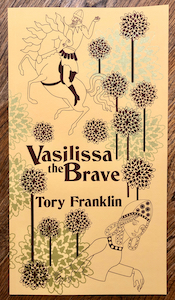
Tory Franklin's work is graphically rich and technically breathtaking. We walked by her table and looked at her oversized short-edition book Vasilissa the Brave. We thought about it throughout the rest of our stroll through the hall, so we went back and bought a copy to take home.
The truth is, some expensive pieces will haunt you, and it's our firm belief that if you are haunted by a comic, you should pay the ghost heed with an offering, which has the added benefit of supporting the artist in their making. Buying the work turns the specter into a real book you can hold and carry with you and even write about after the fact.
This big (approximately 19.5" by 11"), but not long, book is screen printed and hand-painted, in the style of Russian Lubok prints. A re-telling of a famous Baba Yaga story, Franklin's version, with large walnut-ink colored type and a ten hand-colored pages, is the kind of artist's book we'll put on our tallest shelf, and pull out many times over the years just to appreciate how something as commonplace as a book can feel both magical and humane at the same time. Our yearly Short Run splurge, and we don't regret it for a second.
Magda Boreysza's children are becoming — becoming wolves, becoming foxes, becoming tigers. And wolves, foxes, and tigers are becoming girls, from the outside in. Wakeling: How to Transform is a gorgeous reversal of all those fairytales in which young men have the privilege of flight (why would anyone stop being a bird?) and young women are foxy seductresses. Boreysza's girls practice hard, wear masks in the hot summer sun, give their human skin and bones over to win fur and feathers and claws. Instead of growing up, they take on real power. What's stunning about these transformations is that they're only possible on the page, where one thing can be two, or three, or more, without ever not being one. In the same way a book can be more than a movie, these drawings demonstrate how far special effects still have to go.
Serendipity is a great joy of Short Run — the unexpected pairing. Here's one: Nature Is Not My Favorite (Rebekah Markillie), with Vantage #3 (Eroyn Franklin). Nature Is Not My Favorite is the antidote to waldenponding: a short (about the size of a hand of cribbage) essay questioning Northwest nature-worship: "When the world burns, will I have missed some cataclysmic truth by not walking on the same dirt path thousands of other feet have trudged across?" It's true: like the infamous Everett photo, we are all celebrating transcendence we don't, for the most part, experience. Check out Markillie's zines + things; we could have bought everything at the table.
Just as we're hanging up our hiking boots, Eroyn Franklin jumps into the fray. Since 2012, Franklin (co-founder of Short Run — thank you, Eroyn!) has documented a handful of long walks in her Vantage series. Vantage 3 captures a multiplicity of journeys in a disorientingly intricate origami piece — a paper fortune-teller where each future opens from micro to macro. It's a celebration of the long-distance tromp, spent staring at your feet until the world startles you by being bigger than you are.
We are big fans of cartoonist Sarah Mirk, and we were very excited to finally score a copy of her polyamorous sci-fi comic Open Earth at this Short Run. But the real star at her table were the literal hundreds of zines she's made this year — one new zine made for every single day of 2019. We dug through boxes, scanning for five or ten titles that appealed to us, and we came away with a variety of comics: Proud to Be a Socialist, Parts of the Vulva and Vagina That Are Named After Dead Men, Transit Systems as Fictional Characters, and more. In the midst of her most prolific year yet, Mirk is demonstrating the true spirit of Short Run: communication for the sheer exuberance of it, in a populist, mass-market format that is at once low tech and high empathy.
As always, the Seattle Review of Books left Short Run with our collective pockets a few hundred dollars lighter, but with a renewed enthusiasm for Seattle's world-class cartooning community. The joy of it all is to see the infinite variations that artists can enact with just ink and paper, and this year's haul is a wide-ranging collection of work that serves as a testament to art for art's sake.
About that overpopulation, though. We couldn't help but wonder if this is a crossroads year for Short Run. We heard from multiple exhibitors that they struck up conversation after conversation with customers only to hear that they'd traveled from far away to attend the show — some from California, some from the Midwest, some from the East Coast. Short Run, in short, is becoming a destination.
Of course, it was only a matter of time. I don't think there's any other convention that offers table space at such low prices to cartoonists and that doesn't charge an admission fee for attendees. Short Run is meant to be as affordable and accessible as possible, and the cartooning community has risen to that challenge with joy and enthusiasm. That means a lot of people have embraced Short Run as a community, and like anything that you love, those cartoonists have talked about their community to friends, and the friends want to take part in the community now.
So can Short Run grow any bigger while still remaining Short Run? Moving to a bigger venue would probably require the festival to charge more. Adding days to the floor show might strip some of the fun for the exhibitors. Charging a set fee at the door might turn away some of the starving artists who need the show most. It's possible that Short Run can keep going at the same size for the foreseeable future. But the problem is that it's such a beloved festival, with such dedicated fans, that it's hard not to envision more and more people wanting to take part.
We worry because we care. Short Run is simply the best party we can imagine, and a party isn't a party without that small-but-nagging concern in the back of your mind that it's going to end. We want it to go on forever, and we want everyone to know the exuberance and enthusiasm and pure love that we have enjoyed for so long at the show. Is that too much to ask?